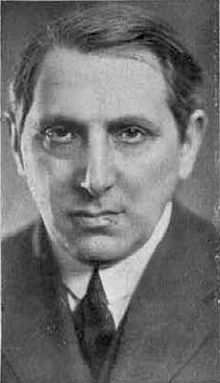Lajos Biró
Lajos Biró (born Ludwig Blau August 22, 1880 in Oradea , Austria-Hungary ; died September 9, 1948 in London ) was a British screenwriter of Hungarian descent who was best known for his collaboration with the film director Alexander Korda .
Life
Ludwig Blau Magyarized his name in Lajos Biró. He began as an editor at the liberal newspaper Budapesti Napló and went to Berlin from 1906 to 1909 . At the end of the First World War he was State Secretary in the Hungarian Foreign Ministry, in 1919 he fled to Vienna.
Biró began a career as a screenwriter in the film industry and over the years has contributed to the making of around 50 films.
During the silent film era he initially worked for German productions and made his debut as the author of the subtitles for Don Juan's Three Nights (1917). Shortly afterwards he met the Hungarian film director Alexander Korda and later (in the 1930s) became chief author of his production company London Film Productions . The most important joint films by Korda and Biró include Prince and Beggar Boy (1920), A Sunken World (1922), based on Biró's novel Serpoletto , Tragedy in the House of Habsburg (1924) and A Dubarry of Today (1927).
In addition, he also worked with other well-known directors and wrote the scripts or subtitles for films such as Das Haus Molitor (1922) by Hans Karl Breslauer , Das Verbotene Paradies (1924), which Ernst Lubitsch staged based on Biró's play The Czarina , Hotel Stadt Lemberg (1927) by Mauritz Stiller based on his story Színmü négy felvonásban , Der Herzensdieb (1927) by Nils Chrisander based on his story A Rablólovag and Der Weg allen Fleisches (1927) by Victor Fleming .
At the first Academy Awards in 1929 he was nominated for an Oscar in the category of best original story for His Last Command (1928) with Emil Jannings , but was defeated by Ben Hecht , who received the Oscar for Underworld (1927).
His collaboration continued with the beginning of the sound film , and so films such as Affair (1931) by Steve Sekely followed . At the beginning of the 1930s , he finally began to work as a screenwriter, template or dialogue author in English-language productions such as The Private Life of Henry VIII (1933) by A. Korda, Katharina the Great (1934) by Paul Czinner , who in turn worked on his play The Czarina based, The Private Life of Don Juan (1934) by A. Korda, The Scarlet Flower (1934) by Harold Young , Rembrandt (1936) by A. Korda, The Man Who Wanted to Change the World (1936) by Lothar Mendes , What will come (1936) by HG Wells , Under the red robe (1937) by Victor Sjöström , Visit to the night (1938) by Tim Whelan , Danger on the Doro Pass (1938) by Alexander Korda's younger brother Zoltan Korda , Pusztaliebe ( 1939) by Géza von Bolváry , Vier Federn (1939) by Z. Korda, Hotel Imperial (1939) by Robert Florey , based on Biró's story Színmü négy felvonásban , The Thief of Baghdad (1940) by Tim Whelan, Ludwig Berger and Michael Powell , Five Graves to Cairo (1943) by Bi lly Wilder and Ein idealer Gatte (1947) by A. Korda.
As a screenwriter, he also worked with other well-known authors such as Carl Zuckmayer ( Rembrandt , 1936) or Hans Gustl Kernmayr ( Pusztaliebe , 1939).
literature
- Hans Giebisch , Gustav Gugitz : Bio-bibliographical literature dictionary of Austria. From the beginning to the present . Hollinek, Vienna 1964, p. 31.
- Biró, Ludwig (Lajos). In: Susanne Blumesberger, Michael Doppelhofer, Gabriele Mauthe: Handbook of Austrian authors of Jewish origin from the 18th to the 20th century . Volume 1: A-I. Edited by the Austrian National Library. Saur, Munich 2002, ISBN 3-598-11545-8 , p. 127.
Web links
- Lajos Biró in the Internet Movie Database (English)
| personal data | |
|---|---|
| SURNAME | Biró, Lajos |
| ALTERNATIVE NAMES | Blue, Lajos |
| BRIEF DESCRIPTION | British screenwriter of Hungarian descent |
| DATE OF BIRTH | August 22, 1880 |
| PLACE OF BIRTH | Oradea , Austria-Hungary |
| DATE OF DEATH | September 9, 1948 |
| Place of death | London |
